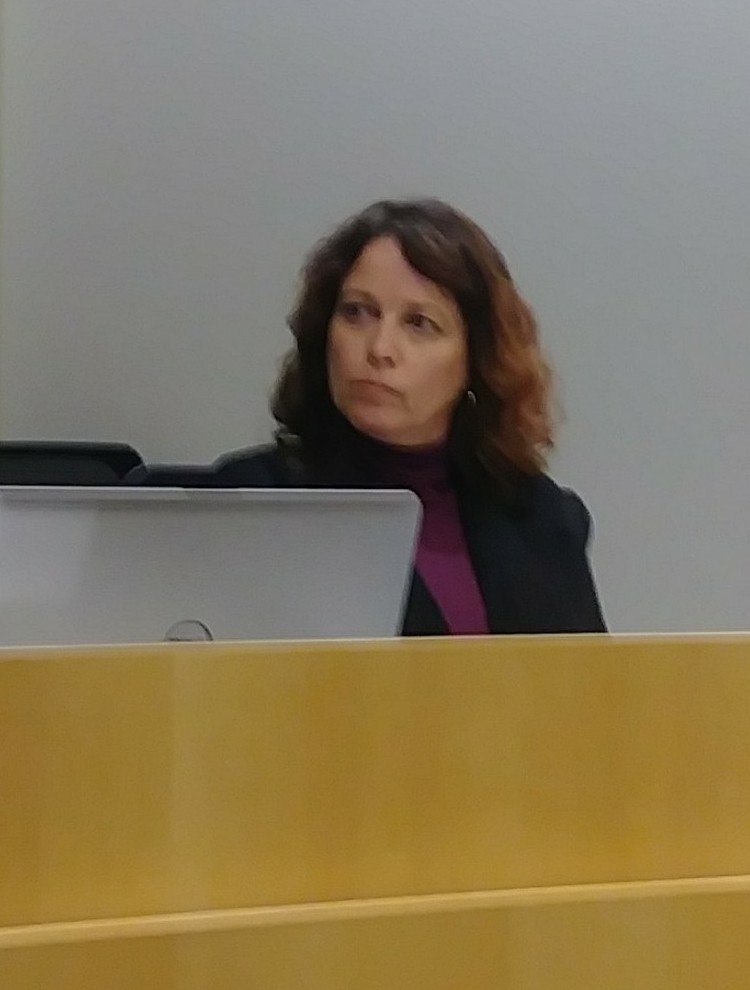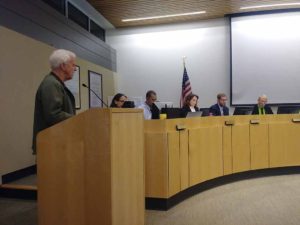By Lois Krafsky-Perry and Staff
Sequim, WA
“What happened?” asked many citizens after the Sequim City Council voted yes on a suggested ordinance by City Attorney Kristina Nelson-Gross.
The decision was to vote yes and direct all appeals A-1 and A- 2 for an administrative permit decision, to the hearing examiner. Hearing Examiner Phil Obrecht has been hired by the City of Sequim.
Olbrecht wrote a letter September 24th stating his reasons for not meeting the planned 3 day court sessions concerning Save Our Sequim and the City of Sequim.
“The hearing scheduled for September 28-30, 2020 is cancelled. I do not have jurisdiction over consolidated permit hearings that include a SEPA appeal. I will be issuing an interlocutory order that outlines the legal basis of this conclusion within the next few days. I will subsequently issue a final decision that addresses the other jurisdictional arguments made by the parties, to avoid remands in case a reviewing court disagrees with my determination.
“Given that one of my objectives as an examiner is to manage an efficient review process, I am disappointed I have to make this ruling. Unfortunately, there is little room for reasonable disagreement on the jurisdictional issue. If I were to retain jurisdiction, a reviewing court would very likely overturn my final decision and remand the appeal back to the City Council to do the entire process over again. Ultimately, correcting course at this time is the only way to prevent what would otherwise be an even more significant unnecessary loss of time and money for all parties. If my ruling is contrary to the wishes of the City Council, the Council may still have the option of amending its code to delegate decision making responsibility on SEPA appeals to the hearing examiner. Procedural rules, which likely includes appellate jurisdiction, is not subject to the vested rights doctrine. See Graham Neighborhood Ass’n v. F.G. Associates, 162 Wn. App. 98 (2011).
“Despite one poorly written SMC section to the contrary, the City’s permit processing framework overall is designed to limit Hearing Examiner review to ministerial permits and minor permitting decisions. The City Council has reserved all significant discretionary decision making to itself. When SEPA came out in the 1970s the courts early on expressly recognized that SEPA can be used to change ministerial permits into discretionary ones, by giving decision makers broad authority to mitigate environmental impacts. This is likely why not one but two SMC permit processing provisions expressly assign SEPA appellate review to the City Council.
“As to arguments brought up by the City and Tribe, the Packwood and SOS appeals were properly consolidated with a final underlying government decision, i.e. the City’s design review decision. SEPA has never been construed as requiring a threshold appeal to be consolidated with the last permit for a proposal. Threshold appeals are routinely processed and resolved prior to the application of building permits. Case law upholds this practice. Finally, as determined in the Puyallup case and as demonstrated in other SMC provisions, references to a “DNS” encompass an “MDNS.” These and other arguments will be fully addressed in my interlocutory order.”
Gross submitted a letter to the City Council calling for a meeting in two days, for an emergency ordinance vote.
Agenda Bill – Interim Controls regarding Title 20 appeals process BB 9-23-20
Citizens rallied to write letters to the council. Many emails and letters were sent to City clerk Sara McMillon. The majority of the letters pleaded with the council and gave reasons not to vote on the two choices devised by Gross. After several email requests, McMillon, who represents the city for contact has not answered our correspondence asking for a number count of letters received by the city, regarding the September 26th meeting.
Retired attorney Robert Bilow also sent an email of explanation.
— Letter from Bilow—
The call by Kristina Nelson-Gross for a September 26, 2020 Special Meeting of the Sequim City Council for the purpose of amending certain appellate portions of Title 20, Sequim Municipal Code is simply representative of the failure by Nelson-Gross to provide professional guidance to the Sequim City Council. Complicating matters, the Hearing Examiner has not yet completed his assignment.
Nelson-Gross states that the decision by the Hearing Examiner to question his jurisdiction “surprised” the City staff. The history of the Hearing Examiner position in Sequim shows that any competent City Attorney should have been well aware of this issue, as follows:
- In 2014 the City Council established the position of Hearing Examiner by Ordinance 2014-002, and by referring to RCW 35A.63.l 10 identified the Examiner’s authority as (a) code enforcement, (b) zoning variances, and (c) conditional-use (Exhibit A)
- In 2019 the City Council passed Ordinance 2019-004, which removed previous references to the “Board of Adjustment”, but which did NOT alter the powers of the Hearing Examiner as it stated: “At Council’s request, the ordinance limits the hearing examiner’s jurisdiction to those matters that are currently delegated to a hearing examiner under the Sequim Municipal Code.” (Exhibit B)
Ms. Nelson-Gross was the Sequim City Attorney when Ordinance 2019-004 was passed, so certainly was aware that “at Council’s request” it did not increase any authority or jurisdiction of the Hearing Examiner. She cannot in good faith claim “surprise” as stated in her comments suggesting this proposed Ordinance.
Furthermore, according to his September 20, 2020 email to all parties, the Hearing Examiner is currently drafting an “interlocutory order” (stated to be completed “in a few days”) and a “final decision”. Why is the Sequim City Attorney in such a hurry to pass an Ordinance before the Hearing; Officer completes his assignment?
City Council members, as elected representatives, are certainly capable of being the hearing body for the appeals in question. To contend otherwise is an insult to those officials. The “timing” is similarly not an issue for a project as important to the Sequim community as this Medication Assisted Treatment clinic. And the “expense” issue cited by Nelson-Gross is another empty concern. Nelson-Gross acts as the City Attorney and should certainly be capable of representing the City before the City Council; and if not, she should be removed as City Attorney.
Another foolish argument posed by Nelson-Gross is that the “Council members’ inexperience” in appellate hearing “could expose the City to significant financial damages.” How absurd! The City has considerable immunity against any such damage, unless the damage is classified as an intentional or negligent “tort”.
Nelson-Gross should know that participating honestly in a City Public Hearing and Appeal cannot rise to the status of an “actionable tort”. And with respect to individual Council members, RCW 4.24.470 provides complete protection from liability for honest actions by Council members. (Exhibit C)
Nelson-Gross next suggests that somehow it is unlikely that the Council as a whole can satisfy the “appearance of fairness” doctrine. That comment is again nonsense, as we have come to expect from the City Attorney. The City Council Rules of Procedure do allow the City Attorney to make “appearance of fairness” decisions, but Rule 8.3 states that those Rules do NOT constitute substantive and binding rules. Also, the Council should note that those Rules of Procedure were adopted by Resolution in 2018 upon the recommendation of Kristina Nelson-Gross herself!
And finally, the Council should be aware that September 18 Nelson-Gross signed, on behalf of the City. a Stipulated MDNS Settlement with the Tribe which included: “Patients who do not have personal or pre-arranged transportation will be provided transportation to and from the clinic.” Accordingly, the clinic might bring patients to Sequim from Seattle, Tacoma, Portland, or elsewhere.
This Ordinance is atrocious and must be defeated.
–End Letter–
Phone problems and technical difficulties interrupted some conversations, as the meeting progressed. It was difficult for the first fifteen minutes to get continuity in conversations, questions, and answers. Often those speaking did not identify themselves.
A couple of times, the phones shut off and had to be re-dialed and accepted, therefore losing more conversations.
Gross presented an overview and read to the council what she had sent to them two days prior to the meeting.
“What ‘we’ are proposing is an emergency code. I assure this is a lawful process under the law… we are also offering an alternate motion”, announced Gross. She then interjected, “the primary difference is we need a majority plus one for an emergency… her voice then went silent and someone from their phone shouted, “we can’t hear”. Five minutes later Gross was heard explaining an emergency ordinance and also mentioned Covid epidemic, which was apparently raised by a question from a council member; this was very confusing to the listeners.
After stating her cause, Gross lectured on city liability and possible individual liability. She often inserted the phrase, “the staff believes”.
She then argued, “contrary to what some believe, we are not transferring any additional power to staff. In explaining the proposed code that the land use appeals would go to the hearing examiner and then to Superior Court”.
Gross made an attempt to apologize if it was taken that she had questioned the councils’ abilities, referring to her letter and probably responding to citizens who had written concerns.
The city attorney then discussed financial implications if the need was to hire outside council. “I would be helping and I would be conflicted”, cautioned Gross. She stated that a most likely scenario could be costing $250. an hour or one hundred thousand dollars.
Barry Berezowsky was called to discuss and answer questions. He took the blame for comments made about the written accusation mocking the council’s possible lack of education or abilities. Many people responded to that phrasing, in Gross’s letter and defended the elected city council members.
Berezowsky continued to explain land use codes. At this point phones again dumped callers and they (we) had to redial to continue the meeting. A question had been raised by Tom Ferrell before the phones cut out again.. The discussion was about, “it could come back to the people. There could still be public input:”. It could be assumed it was discussion about the process, if the vote was taken on the two suggested choices. .
Mayor William Armacost said he would love to hear what the hearing examiner has to say.
While discussing the process, questions were asked by Councilman Tom Ferrell.
“Why can’t we say 2 weeks?” Gross said, “process already has been triggered handed back to you—in your lap”.
Gross stated that it may remit back to city council and council maybe could make the change.
An unidentified council member said, “we have the capacity if it has to come back to the council”.
There was discussion by council members Tom Ferrell and Mike Pence. “We handed it to the hearing examiner, it is up to us to fix this. Let’s make it when he can do it again,” suggested Pence.
Mayor Armacost called for the decision on a motion for the Emergency Ordinance which was rejected by the vote of one abstained, four ‘yes’ and one ‘no’.
Dennis Smith, Brandon Janisse, Mike Pence, and Tom Ferrell voted ‘yes’. Sarah Kincaid abstained and Mayor Armacost voted ‘no’.
It did not pass.
Proposed Emergency Interim Controls Ordinance Revising Sequim Municipal Code Chapter 20.01
Then the alternate motion was called for and passed.
Sarah Kincaid, Brandon Janisse, Mike Pence, Tom Ferrell, and Dennis Smith voted ‘yes’. Mayor Armacost voted ‘no’. It passed.
It passed with the vote Kincaid, Janisse, Pence, Smith, Ferrell ‘yes’ and William Armacost ‘no’.
Proposed standard Interim Controls Ordinance Revising Sequim Municipal Code Chapter 20.01
The next Sequim City Council meeting is scheduled for October 12th, 2020.



Recent Comments